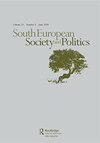2019年4月和5月的西班牙多次选举:领土和左右两极分化的影响
IF 4.6
1区 社会学
Q1 POLITICAL SCIENCE
引用次数: 32
摘要
本文分析了2019年西班牙的地方、地区、欧洲和4月份的大选。2017年加泰罗尼亚的宪法危机、导致社会党新政府的不信任动议以及激进右翼政党VOX的出现,都导致西班牙政治变得更加两极化。本文还从左右翼和领土的角度讨论了两极分化,这两方面在西班牙既有历史原因,也因为分析期间的机构决策而密切相关。最后,本文展示了非制度化政党制度下的选举结果、政府组建过程和两极化的政治含义。本文章由计算机程序翻译,如有差异,请以英文原文为准。
The Multiple Spanish Elections of April and May 2019: The Impact of Territorial and Left-right Polarisation
ABSTRACT This article analyses the 2019 local, regional, European and April general elections in Spain. The constitutional crisis in Catalonia in 2017, the motion of no-confidence leading to the new Socialist government and the emergence of a radical right-wing party, VOX, all led to Spanish politics becoming more polarised. This paper also discusses polarisation from both the left-right and the territorial perspectives, intimately linked in Spain both for historical reasons but also because of agency decisions during the period analysed. Finally, the article shows the electoral results, government formation processes and political implications of polarisation in a non-institutionalised party system.
求助全文
通过发布文献求助,成功后即可免费获取论文全文。
去求助
来源期刊

South European Society and Politics
Multiple-
CiteScore
5.80
自引率
21.20%
发文量
14
期刊介绍:
A leading point of reference for scholars of Southern Europe, South European Society and Politics promotes both comparative and inter-disciplinary analyses, as well as offering innovative single county and sub-national studies. The journal acts as a forum for social, economic, cultural, contemporary historical and political approaches to research on the region, and is particularly keen to sponsor policy–focused studies in all these disciplines. The journal publishes research articles; South European Atlas with election reports and articles on other subjects of topical interest, and an extensive book reviews section, including both review articles and individual book reviews.
 求助内容:
求助内容: 应助结果提醒方式:
应助结果提醒方式:


